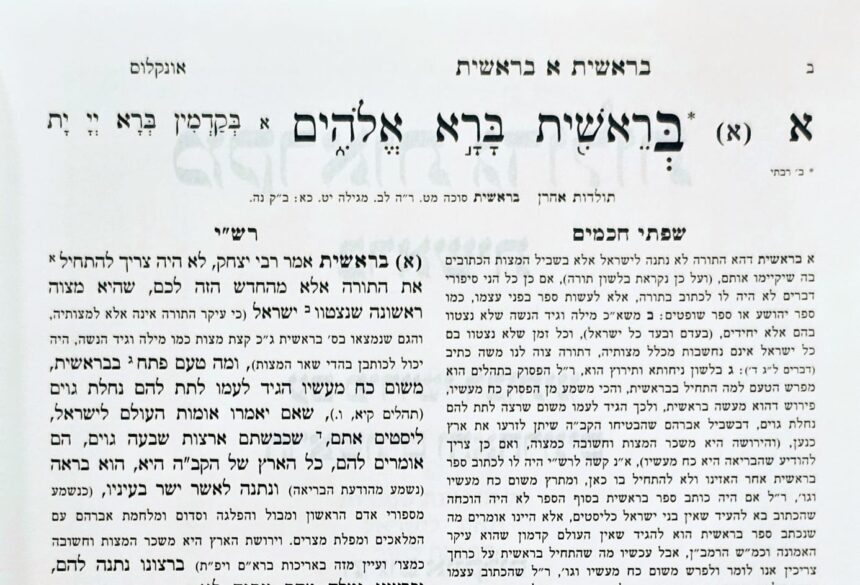Israel’s efforts to explain its position (“hasbara”) have faced significant resistance. A strategy focused on immediate security threats and externalizing the blame for conflict solely onto our adversaries often fails to resonate on the global stage.
This approach, perceived by many as reactive and defensive, obscures the profound, millennia-old foundations of the Jewish claim to the Land of Israel. It risks leaving unchallenged the very same tales that seek to delegitimize our presence by painting us as foreign usurpers.
But what if the framework for a more compelling, authentic, and enduring claim already exists within our own sources? What if the very challenge we face today – questioning our foundational right to the land – was anticipated by our sages centuries ago?
This campaign, “The Genesis Chronicle: Israel’s Irrefutable Claim,” turns to precisely such wisdom. It draws its core message directly from the most foundational Jewish text. Remarkably, Rashi’s classic explanation of the Torah’s very first verse foresaw the accusation that the Jewish people are “bandits” for inheriting the Land of Israel.
In addressing why the Torah begins with Creation rather than the first commandment, our sages provided the essential argument needed: The entire world belongs to the Creator. His act of Creation establishes His sovereign right to allocate His world according to His will. The Jewish presence in the Land of Israel, therefore, is not as an act of appropriation, but the fulfillment of a role designated by the ultimate Owner of all lands.
This campaign aims to presenting the essential, yet often overlooked, dimension of Israel’s claim. It utilizes an argument provided for us by our own ancient sources – one rooted in universal beginnings, divine authority, and an enduring covenant – to powerfully articulate the legitimacy and antiquity of the Jewish people’s ownership of their homeland.
It is time we unashamedly leveraged the profound foresight embedded within our own heritage:
Campaign Title: The Genesis Chronicle: Israel’s Irrefutable Claim
Goal: To articulate the legitimacy of the Jewish people’s connection to the Land of Israel, drawing upon the most foundational Jewish text to counter claims that portray Israel’s existence as solely a modern political construct or colonial enterprise. To frame the connection as ancient, inherent, and rooted in understanding creation and divine will.
Target Audience
- International audiences interested in history, theology, and the roots of the conflict.
- Faith-based communities (Jewish Diaspora, religious groups familiar with the Hebrew Bible).
- Academics and opinion leaders engaged with Middle Eastern studies and religious history.
- General public exposed to simplistic portrayals of the conflict.
Core Message
The Jewish claim to the Land of Israel is neither political nor recent. It is a foundational element of Judaism, articulated millennia ago, rooted in the acceptance that the Creator of the entire world designated this specific land for the Jewish people as part of the divine plan. This understanding, exemplified by Rashi’s commentary on the Torah’s opening, predates modern conflicts and reframes the narrative from one of conquest (“bandits”) to one of fulfilling a unique, ancient, divinely-assigned purpose.
Why Does the Story Begin Here? Understanding Israel’s Ancient Roots
The Torah, the foundational text of Judaism, surprisingly doesn’t begin with the first laws given to the Jewish people. It starts with the story of Creation: “In the beginning, G-d created the heavens and the earth…”
Why? The preeminent medieval commentator, Rashi (Rabbi Shlomo Yitzchaki, 1040-1105), asks this very question. Citing an earlier sage, Rabbi Yitzchak, Rashi explains that the Torah starts with Creation to establish a fundamental truth: the entire world belongs to the Creator.
Rashi explains the practical implication: Should the nations of the world accuse Israel of being “bandits” for possessing the Land of Israel, the response is rooted in this universal beginning. The Creator, who made everything, allocated the Land as He saw fit. Rashi quotes the verse (Psalms 111:6), “The power of His acts He told to His people, in order to give them the estate of nations.” He concludes: “By His wish He gave it to the previous inhabitants, and by His wish He took it from them and gave it to us.”
What does this ancient commentary teach us today?
- Divine Ownership: The ultimate claim is based on the universal principle that the world belongs to its Creator.
- Ancient Claim: The Jewish link to the Land is not a 20th-century invention. It is a principle embedded in our most foundational text and mission for over a millennium, addressing potential legitimacy challenges head-on.
- Reframing the Debate: This perspective counters the simplistic “colonizer” or “bandit” accusation by grounding the Jewish presence in the context of divine designation and return.
- A Foundational Belief: This teaching underscores that for the Jewish people, the relationship with the Land of Israel is not merely historical or political, but profoundly spiritual and moral, tied to the very purpose of Creation.
Understanding this message reveals the depth and antiquity of the Jewish people’s claim to their homeland, rooted not in conquest, but in a covenantal relationship originating with the Creator Himself.
Slogans
- Israel: Rooted in Creation.
- The Genesis Chronicle: Our Ancient Claim.
- More Than a Land: A Divine Promise.
- The Creator’s Blueprint: Israel’s Heritage.
- Returning Home By Divine Will.
- Our Claim: As Ancient as Creation Itself.
Talking Points for Spokesmen/Diplomats
- Start with the Source: “A foundational question in Jewish thought, addressed by our primary biblical commentator Rashi almost 1,000 years ago, asks why the Torah begins with Genesis. His answer directly addresses the legitimacy of the Jewish presence in the Land of Israel.”
- The Core Argument: “Rashi explains, citing Rabbi Yitzchak, that the Creation account establishes G-d as the creator and owner of the entire world. Therefore, He has the authority to allocate land according to His will. Jewish presence in Israel is by divine assignment.” (Reference Psalm 111:6 if appropriate).
- Pre-empting Accusations: “Remarkably, Rashi explicitly used this argument to pre-empt the charge of ‘bandits’ or illegitimate conquerors 1,000 years ago. This shows that questions of legitimacy regarding Jewish presence in the Land are ancient, and so should be the Jewish response.”
- Nature of the Connection: “This highlights that, from a traditional Jewish perspective, the connection to the Land isn’t just about historical presence or political necessity; it’s a core theological and spiritual principle tied to the world’s very creation.”
- Not Exclusionary Universalism: “The argument rests on God’s universal ownership (‘He created the whole world’), placing the specific designation of Israel within a divine global plan, rather than arbitrary favoritism.”
- Depth vs. Politics: “Understanding this foundational claim is crucial to grasping the depth and permanence of the Jewish connection to Israel. It’s part of our millennia-old identity.”
- Countering Anachronism: “Some might see this as an ancient argument irrelevant today. However, its relevance lies in demonstrating the consistency and antiquity of the Jewish claim and self-understanding, countering portrayals as foreign newcomers or colonizers with no prior claim.”
Strategy and Tactics
- Targeted Educational Materials:
- Create visually appealing infographics and short videos explaining Rashi’s comment and its context.
- Develop pamphlets and online explainers specifically for Jewish Diaspora communities and religious groups interested in biblical commentary and Israel.
- Translate materials into relevant languages.
- Faith Leader Engagement:
- Brief sympathetic rabbis and theologians on these talking points for use in sermons, articles, and dialogues.
- Organize webinars or seminars focusing on “Theological Roots of the Jewish Claim to Israel.”
- Digital Diplomacy:
- Utilize social media platforms (Twitter, Facebook, Instagram) with targeted posts using the slogans and key messages (#GenesisChronicle, #RootedInCreation, #GenesisOne).
- Produce short, animated videos explaining the concept.
- Engage in online discussions, introducing this perspective.
- Academic Outreach:
- Encourage scholars to explore this theme in papers and conferences.
- Provide resources to university departments of Jewish Studies, Religious Studies, and Middle Eastern Studies.
- Integration into Broader Hasbara:
- Ensure this narrative layer is included in training materials for diplomats, spokesmen, and emissaries.
- Cultural Diplomacy:
- Support artistic expressions (visual arts, literature, music) that explore the theme of creation and the land.
By publicizing this ancient commentary, we can add an effective dimension to Israel’s public diplomacy, emphasizing the timeless nature of the Jewish people’s claim to the Land.





